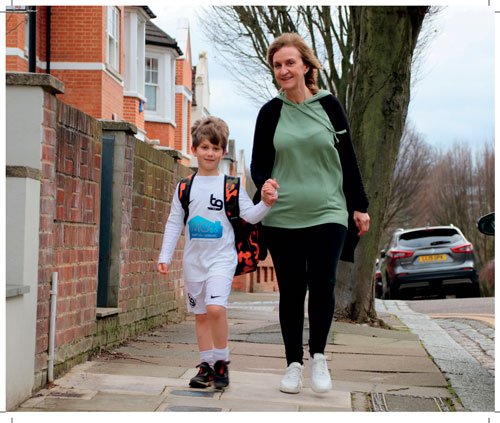
by Adele Aitchison
GrandNanny Founder
www.grandnanny.co.uk
New childcare services in the UK are offering families the chance of reliable, flexible, part-time childcare from experienced over-50s. From mental wellbeing, to being a substitute grandparent for families, the benefits of intergenerational childcare are becoming clear to parents, children AND older workers.
Parents can all identify with the strain of stretching their time to cover work, home admin, the school or nursery run, and after-school activities. Twenty four hours in a day don’t seem enough! ‘The juggle is real’ and whether your child is in nursery or school, finding the right childcare solution can be fraught with worry and frustration, especially at a time when some nurseries and after-school clubs have shut down locally.
It’s clear that families need reliability and experience. Now that many people’s work patterns have changed from the classic ‘9 to 5’ – whether because of flexible working, working from home, or night shifts – flexibility is also really important, but often difficult to find.
As a new solution, the UK has recently started adopting a trend that’s already popular in the US and Japan – matching older people with young families, to give them the reliable, part-time childcare they desperately need. Research has shown intergenerational programmes can improve mental and physical wellbeing for older people, whilst helping the kids they care for have better age-empathy, development and social skills.
As founder of GrandNanny, I was inspired by my memories of being looked-after, as a child, by my grandparents. My grandparents were very involved in my childcare growing up, but when I moved to London, I realised loneliness among older adults is a huge issue. This is especially true for those who aren’t in touch with family or who aren’t working. I felt strongly that families were missing the huge experience and care older adults can bring. I could see very clearly the benefits of connecting older people to those in their communities and have seen hugely positive feedback from all age-groups.
For older workers, nannying can promote mental and physical wellbeing, with a job that keeps body and brain active and provides a valued role in the family and wider community. If they were previously not considered for a job because of their age, their experience is viewed with a fresh perspective – as a valuable skill – and they are ‘seen’ again by the society. Parents get reliable help from someone who really gets to know their family and child and has a range of skills and specialist knowledge from their previous careers. Kids get all the great stuff you’d expect, from someone to help with reading or homework or to bake, play music and go to the park with.
Anna, a 57 year old former receptionist who lost her job last year, started nannying two months after being made redundant, taking care of siblings aged seven and three. She became a grandparent figure for them – getting them ready in the morning and taking them to school, cooking dinner, and reading a bedtime story. Having three grown-up girls and a grandson and always looking after kids for friends, she had plenty of personal experience of childcare. Anna says working as a nanny helps her to keep a young and optimistic outlook and spend time in the fresh air, but also gives her the flexibility to look after her own grandson while still earning an income.
The family Anna works for say she has been a great help to them, really helping lighten the load. She has also become a ‘substitute grandparent’ to the children in her care, something that’s all the more precious because they don’t have their biological grandparents close-by.
So far, as this new approach to childcare takes off in the UK, a huge range of over-50s, from musicians to events organisers, former teachers to nurses say they have found a new and rewarding career as a nanny. They can bring unexpected skills in creativity or learning that the family might not get in a different childcare setting, as well as specialist knowledge for children with specific additional needs.
The families who’ve seen the huge benefits of an over-50s childcarer for their families, really appreciate the flexibility and peace of mind such a service offers.
For anyone who may not have had a nanny before, this important new trend seems to be a win-win-win situation for everyone involved.











